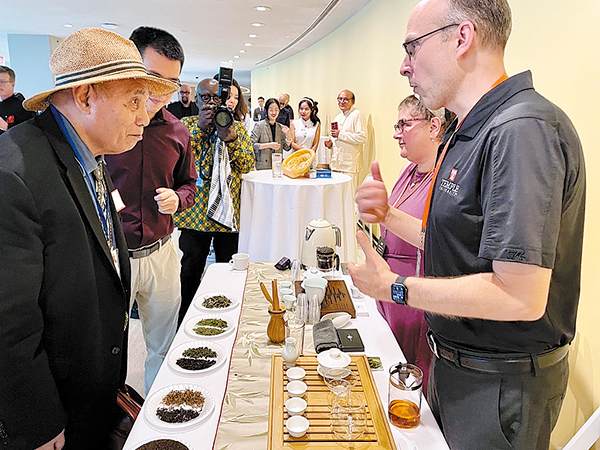

Cultural ambassador
Tea, which originated in China, has transcended its humble beginnings to become a symbol of the country's evolution from feudal and colonial times to today's era of economic globalization. For China, tea acts as a cultural ambassador, bringing people together to savor a pot of hot tea and learn more about the country, its history, its culture.
Cindy Tuisku, 66, flew back to her home in San Francisco, California, from China in December after completing a six-week internship program in Mount Wuyi in Fujian province, where different kinds of tea, including Da Hong Pao, are grown.
"It was like a dream tea trip. Everything went so well. There was a beautiful tea garden right outside my door. From that experimental tea garden, you can walk up into the hills," she said.
"We went to the area where the six mother bushes of the Da Hong Pao trees are. … I'd seen pictures of that place, and I'd heard of that place, and I love that tea. I was right underneath the tree at the national preserved area there.
"We were sitting there drinking Da Hong Pao … surrounded by the tea gardens. I kept pinching myself, I can't believe I'm actually here, and then we took the bamboo raft trip down the Nine-bend River."
Tuisku has been studying Chinese tea culture for the past five years, but her first encounter with it was purely by chance when she unexpectedly took part in a "tea experience" through Airbnb.
"I was the only student in the class, and (the tea master) took me through the six categories of tea," she said. "It was amazing by the time I was done, (I had) already scheduled to come back with my niece, and she asked her husband, and I just got into it, and I started to look for tea opportunities near where I live."
Tuisku said she first started visiting tea vendors and teahouses in San Francisco. Then she began learning online about tea culture. Later, she joined many tea communities in the US, became part of the Global Tea Volunteer Program and got a chance to visit China.
"Tea brings everyone together. We all took that opportunity to get together at a teahouse and have some good conversations. Now, it's four times a week, I get together with folks over Zoom who might be all over the world, … in Austria or Australia, or in China or Germany, to have tea," Tuisku said, sitting in front of her tea table.
Tuisku has also taken part in several tea events in the US organized by tea communities. There are many little groups around the US learning about Chinese tea and culture, she said, such as the New York Tea Society, Global Tea Initiatives in California and the Northwest Tea Festival in Seattle, Washington.
The tea lovers' community in the US and the rest of the world is huge and interconnected, and Tuisku and her friends usually meet on platforms such as Kung Fu Tea Facebook page, or through tea culture apps or just in a teahouse, sharing their stories of Chinese tea, she said.
In addition to the existing tea culture in the US and other countries, the rising popularity of bubble tea has drawn the attention of people across many countries. Retailers and teahouses are now offering more authentic tea bases and flavors in their outlets, importing tea leaves from China for better taste, though some tea lovers look for authentic and traditional Chinese tea.
Duo Cafe is such outlet that blends traditional Chinese tea with locally popular beverages and combines them with snacks. The "new-style" teahouse has been drawing an increasing number of New York residents, including the younger generations, eager to explore authentic tea. People are drawn to the outlet "perhaps because I'm from Fujian province, and there is an abundance of tea in our region", said Ian Wang, the 28-year-old owner of the teahouse.
"I have been influenced by the tea culture since I was young. So, I thought that in New York, there might be a lot of Japanese matcha and sencha and afternoon teahouses, but there are relatively few places that offer traditional Chinese tea. I wanted to bring this part of our traditional Chinese culture, this tea culture, to this place — to introduce our Chinese traditions to the local community and … (allow) more people to experience it."
Customers can immerse themselves in the entire process of tea-making, starting from selecting their tea from a hand-drawn menu, to savoring its aroma, and then personally brewing and steeping the tea, Wang said. Every step is a hands-on experience that allows guests to connect with the tea on a deeper level.